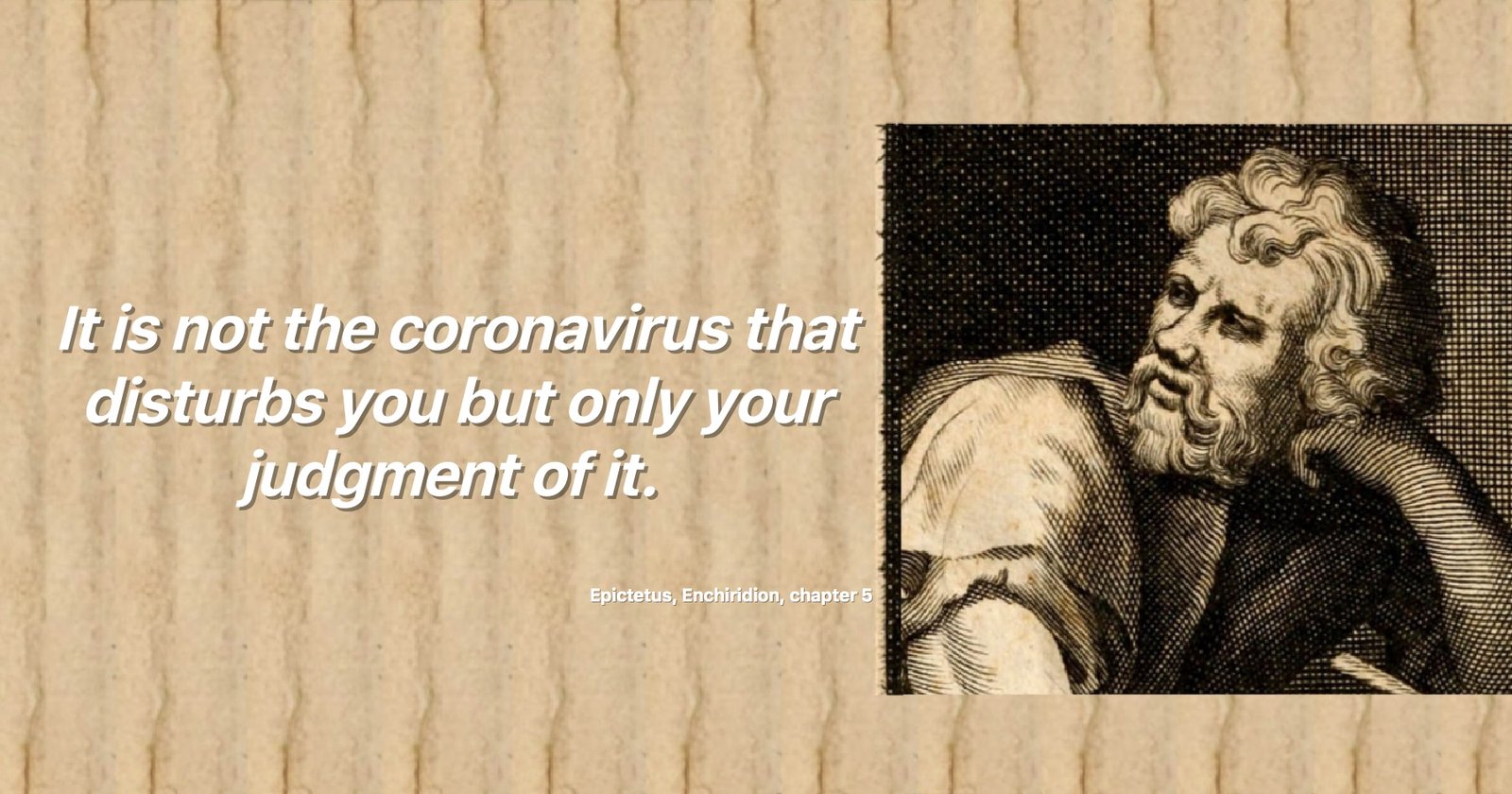Note:
I understand that the containment measures are valid and that the problem is real. The image was chosen to alert against panic and irrational fear. You probably have enough toilet paper at home.
This is one of my favorite letters. In it Seneca addresses the main factor that hinders our development, the fear.
What prevents you from seeking your dream work, from making art, from traveling the world, from exposing yourself? It’s Fear. It’s that simple. We can give the excuse of being busy or at a bad time or not having talent or resources or a million other things, but in reality many times it is the fear that holds us back.
The 13th letter begins by arguing that we have to experience certain things to build our character and develop resistance against them:
“no fighter can go with high expectation into the fight if he has never been beaten; the only competitor who can enter the fight with confidence is the man who has seen his own blood, who has felt his teeth rattle under his opponent’s fist… the one who, as often as he falls, rises again with greater stubbornness than ever before” (XII, 2)
He continues:
“There are more things, Lucilius, that can frighten us than there are to defeat us; we suffer more in the imagination than in reality… Thus, some things torment us more than they should; some torment us before they should; and some torment us when they should not. “(XIII, 4)
Both passages later became the main theme of Epictetus: we must distance ourselves from our first impressions, consider them rationally and decide whether to give or withhold approval from them. In fact, we suffer more often in our imagination than in reality, as reality is often more bearable than our fears let us believe.
Points:
- To know your fear is to defeat it;
- Things are often worse in your mind;
- Explore what could really go wrong;
- Don’t panic, it is witless (§9).
Also on LinkedIn and Medium
1. I know that you have plenty of spirit; for even before you began to equip yourself with maxims which were wholesome and potent to overcome obstacles, you were taking pride in your contest with Fortune; and this is all the more true, now that you have grappled with Fortune and tested your powers. For our powers can never inspire in us implicit faith in ourselves except when many difficulties have confronted us on this side and on that, and have occasionally even come to close quarters with us. It is only in this way that the true spirit can be tested, – the spirit that will never consent to come under the jurisdiction of things external to ourselves.
2. This is the touchstone of such a spirit; no prizefighter can go with high spirits into the strife if he has never been beaten black and blue; the only contestant who can confidently enter the lists is the man who has seen his own blood, who has felt his teeth rattle beneath his opponent’s fist, who has been tripped and felt the full force of his adversary’s charge, who has been downed in body but not in spirit, one who, as often as he falls, rises again with greater defiance than ever.
3. So then, to keep up my figure, Fortune has often in the past got the upper hand of you, and yet you have not surrendered, but have leaped up and stood your ground still more eagerly. For manliness gains much strength by being challenged; nevertheless, if you approve, allow me to offer some additional safeguards by which you may fortify yourself.
4. There are more things, Lucilius, likely to frighten us than there are to crush us; we suffer more often in imagination than in reality. I am not speaking with you in the Stoic strain but in my milder style. For it is our Stoic fashion to speak of all those things, which provoke cries and groans, as unimportant and beneath notice; but you and I must drop such great-sounding words, although, Heaven knows, they are true enough. What I advise you to do is, not to be unhappy before the crisis comes; since it may be that the dangers before which you paled as if they were threatening you, will never come upon you; they certainly have not yet come.
5. Accordingly, some things torment us more than they ought; some torment us before they ought; and some torment us when they ought not to torment us at all. We are in the habit of exaggerating, or imagining, or anticipating, sorrow. The first of these three faults[1] may be postponed for the present, because the subject is under discussion and the case is still in court, so to speak. That which I should call trifling, you will maintain to be most serious; for of course I know that some men laugh while being flogged, and that others wince at a box on the ear. We shall consider later whether these evils derive their power from their own strength, or from our own weakness.
6. Do me the favour, when men surround you and try to talk you into believing that you are unhappy, to consider not what you hear but what you yourself feel, and to take counsel with your feelings and question yourself independently, because you know your own affairs better than anyone else does. Ask: “Is there any reason why these persons should condole with me? Why should they be worried or even fear some infection from me, as if troubles could be transmitted? Is there any evil involved, or is it a matter merely of ill report, rather than an evil?” Put the question voluntarily to yourself: “Am I tormented without sufficient reason, am I morose, and do I convert what is not an evil into what is an evil?”
7. You may retort with the question: “How am I to know whether my sufferings are real or imaginary?” Here is the rule for such matters: We are tormented either by things present, or by things to come, or by both. As to things present, the decision is easy. Suppose that your person enjoys freedom and health, and that you do not suffer from any external injury. As to what may happen to it in the future, we shall see later on. To-day there is nothing wrong with it.
8. “But,” you say, “something will happen to it.” First of all, consider whether your proofs of future trouble are sure. For it is more often the case that we are troubled by our apprehensions, and that we are mocked by that mocker, rumour, which is wont to settle wars, but much more often settles individuals. Yes, my dear Lucilius; we agree too quickly with what people say. We do not put to the test those things which cause our fear; we do not examine into them; we blench and retreat just like soldiers who are forced to abandon their camp because of a dust-cloud raised by stampeding cattle, or are thrown into a panic by the spreading of some unauthenticated rumour.
9. And somehow or other it is the idle report that disturbs us most. For truth has its own definite boundaries, but that which arises from uncertainty is delivered over to guesswork and the irresponsible license of a frightened mind. That is why no fear is so ruinous and so uncontrollable as panic fear. For other fears are groundless, but this fear is witless.
10. Let us, then, look carefully into the matter. It is likely that some troubles will befall us; but it is not a present fact. How often has the unexpected happened! How often has the expected never come to pass! And even though it is ordained to be, what does it avail to run out to meet your suffering? You will suffer soon enough, when it arrives; so look forward meanwhile to better things.
11. What shall you gain by doing this? Time. There will be many happenings meanwhile which will serve to postpone, or end, or pass on to another person, the trials which are near or even in your very presence. A fire has opened the way to flight. Men have been let down softly by a catastrophe. Sometimes the sword has been checked even at the victim’s throat. Men have survived their own executioners. Even bad fortune is fickle. Perhaps it will come, perhaps not; in the meantime it is not. So look forward to better things.
12. The mind at times fashions for itself false shapes of evil when there are no signs that point to any evil; it twists into the worst construction some word of doubtful meaning; or it fancies some personal grudge to be more serious than it really is, considering not how angry the enemy is, but to what lengths he may go if he is angry. But life is not worth living, and there is no limit to our sorrows, if we indulge our fears to the greatest possible extent; in this matter, let prudence help you, and contemn with a resolute spirit even when it is in plain sight. If you cannot do this, counter one weakness with another, and temper your fear with hope. There is nothing so certain among these objects of fear that it is not more certain still that things we dread sink into nothing and that things we hope for mock us.
13. Accordingly, weigh carefully your hopes as well as your fears, and whenever all the elements are in doubt, decide in your own favour; believe what you prefer. And if fear wins a majority of the votes, incline in the other direction anyhow, and cease to harass your soul, reflecting continually that most mortals, even when no troubles are actually at hand or are certainly to be expected in the future, become excited and disquieted. No one calls a halt on himself, when he begins to be urged ahead; nor does he regulate his alarm according to the truth. No one says; “The author of the story is a fool, and he who has believed it is a fool, as well as he who fabricated it.” We let ourselves drift with every breeze; we are frightened at uncertainties, just as if they were certain. We observe no moderation. The slightest thing turns the scales and throws us forthwith into a panic.
14. But I am ashamed either to admonish you sternly or to try to beguile you with such mild remedies.[2] Let another say: “Perhaps the worst will not happen.” You yourself must say: “Well, what if it does happen? Let us see who wins! Perhaps it happens for my best interests; it may be that such a death will shed credit upon my life.” Socrates was ennobled by the hemlock draught. Wrench from Cato’s hand his sword, the vindicator of liberty, and you deprive him of the greatest share of his glory.
15. I am exhorting you far too long, since you need reminding rather than exhortation. The path on which I am leading you is not different from that on which your nature leads you; you were born to such conduct as I describe. Hence there is all the more reason why you should increase and beautify the good that is in you.
16. But now, to close my letter, I have only to stamp the usual seal upon it, in other words, to commit thereto some noble message to be delivered to you: “The fool, with all his other faults, has this also, – he is always getting ready to live.”[3] Reflect, my esteemed Lucilius, what this saying means, and you will see how revolting is the fickleness of men who lay down every day new foundations of life, and begin to build up fresh hopes even at the brink of the grave.
17. Look within your own mind for individual instances; you will think of old men who are preparing themselves at that very hour for a political career, or for travel, or for business. And what is baser than getting ready to live when you are already old? I should not name the author of this motto, except that it is somewhat unknown to fame and is not one of those popular sayings of Epicurus which I have allowed myself to praise and to appropriate.
Farewell
Footnotes
- ↑ Seneca dismisses the topic of “exaggerated ills,” because judgements will differ concerning present troubles; the Stoics, for example, would not admit that torture was an evil at all. He then passes on to the topic of “imaginary ills,” §§ 6-7, and afterwards to “anticipated ills,” §§ 8-11. From § 12 on, he deals with both imaginary and anticipated ills.
- ↑ Cf. Solon’s καί με κωτίλλοντα λείως τραχὺν ἐκφανεῖ νόον.
- ↑ Epicurus, Frag. 494 Usener.







